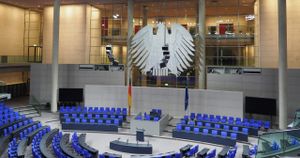The European Union is ramping up its military support for Ukraine with a prospective aid package worth approximately €20 billion ($20.9 billion), according to reports from Bloomberg on February 21, 2024. This substantial initiative aims to fortify Ukraine's defenses amid the increasing pressure for ceasefire negotiations from the U.S. government under President Donald Trump.
The military assistance is set to provide Ukraine with much-needed air defense systems, artillery ammunition, long-range missiles, and drones. Discussions surrounding the aid package are expected at the upcoming foreign ministers meeting, where EU member states will decide how best to contribute—whether through cash or military equipment. A sticking point may be Hungary's opposition to additional aid, complicate the agreement process.
Earlier this week, Politico highlighted additional security support valued at least $6.2 billion, indicating the EU’s continued efforts to bolster Ukraine's military capabilities as U.S.-Russia talks aimed at resolving the conflict unfolded.
On another front, the EU has taken substantial steps to impose sanctions on 48 individuals and 35 entities accused of actions undermining Ukraine's sovereignty. This comprehensive sixteenth package of sanctions includes restrictions on Russian military-industrial complexes and actions against third parties supporting Russia’s aggression.
The sanctions not only maintain pressure on the Russian military but also aim to cut off substantial revenue streams, such as actions targeting firms involved with transportation and the shadow fleet responsible for Russian crude oil exports.
For the first time, the Council has also targeted Garantex, a cryptocurrency exchange associated with EU-sanctioned Russian banks, indicating the EU’s continuing adaptability to the changing dynamics of the Russian war effort.
Despite these efforts, a recent report highlighted the paradox of EU spending, where financial allocations for Russian fossil fuels dramatically outweighed the aid directed toward Ukraine. The EU spent €21.9 billion on Russian oil and gas during the past year, surpassing the €18.7 billion allocated to Ukraine for all forms of financial aid, as reported by the Centre for Research on Energy and Clean Air. Analyst Vaibhav Raghunandan noted, “Purchasing Russian fossil fuels is, quite plainly, akin to sending financial aid to the Kremlin and enabling its invasion.”
This financial imbalance reflects criticisms of the EU’s commitment level when compared to historical aid to nations involved in past conflicts, with experts highlighting how the EU's support mechanisms seem muted against past responsiveness.
Beyond military and monetary support, the EU continues to aid Ukraine's efforts toward demining and reconstruction, committing around €80 million since 2022 to facilitate safe returns for displaced individuals. These actions underline the EU's multifaceted approach to supporting Ukraine's recovery and resilience.
The European Commission has shared updates on how these funds assist with humanitarian mine action and reconstruction efforts, targeting infrastructure repairs to schools and energy facilities damaged during attacks. Providing mini power stations and refurbishing over 80 educational institutions, the EU is actively working to restore normalcy and support education among affected communities.
Reinforcing these efforts, the EU is also enhancing cooperation with the International Criminal Court (ICC) to investigate war crimes committed during the conflict. Support totaling €7.25 million has been pledged to bolster the investigation capacities of the ICC and help collect evidence against individuals responsible for atrocities. This collective international and local effort aims to hold accountable those who undermine peace and stability.
Despite the admirable goals and support visible on paper, the European Council’s repeated affirmations of solidarity with Ukraine are weighed against the sobering reality of continued fossil fuel purchases from Russia. These imports funded the Kremlin's war efforts and created waves of criticism directed at European policies.
The Council has reiterated its stance, stating, “Russia must not prevail,” stressing the necessity of unity and strategic action to support Ukraine effectively. With each package of sanctions and financial aid proposed, the EU grapples with the delicate balance between energy needs and political commitments.
Looking forward, the EU is poised to intensify pressure on Russia as necessary, all the whilst continuing its humanitarian and military support to Ukraine. The hope remains strong among Ukrainian leaders and citizens, who are counting on their European allies for both immediate support and long-term strategies aimed at returning stability to their homeland.



